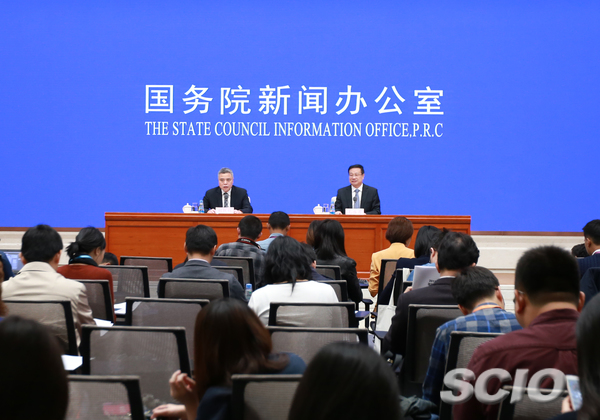China's economy holds steady against headwinds
China's economy held up well over the past few quarters as strong consumption and steady industrial shift fended off external headwinds, with the stability expected to extend throughout the rest of the year.
China's economy held up well over the past few quarters as strong consumption and steady industrial shift fended off external headwinds, with the stability expected to extend throughout the rest of the year.
The gross domestic product (GDP) expanded 6.7 percent year on year in the first three quarters of 2018 to about 65.09 trillion yuan (about 9.38 trillion U.S. dollars), data from the National Bureau of Statistics (NBS) showed Friday.

The pace was in line with market expectations and higher than the government's annual growth target of around 6.5 percent.
In the third quarter, China's GDP rose 6.5 percent from a year ago, compared to a 6.7-percent increase in the second quarter, the NBS said in a statement.
The economy has expanded in a reasonable range and maintained a trend of overall stability and steady progress, the statistical authority said, while acknowledging that the country faces more external challenges and rising downward pressure.
The service sector ticked up 7.7 percent year on year in the January-September period, picking up from a 7.6-percent increase in the first half, and outpacing 3.4 percent in primary industry and 5.8 percent in secondary industry.
The A-share market rallied, reversing days of weakness, with the benchmark Shanghai Composite Index up 2.58 percent, at 2,550.47 points. The NASDAQ-style ChiNext Index gained 3.72 percent.
NBS spokesperson Mao Shengyong told a press conference that the sound long-term economic fundamentals continued, citing vigorous job creation, mild consumer inflation, and disposable personal income growth that basically matched economic expansion.
Consumption still played a prominent role in driving growth, contributing 78 percent of the GDP, Mao said.
The spokesperson denied so-called "consumption downgrade" as retail sales remained robust, the proportion of services consumption became bigger, and quality products, including cosmetics, smart home appliances, and SUVs, were more popular.
Morgan Stanley economist Robin Xing said the investment bank maintained its forecast on China's GDP growth in 2018 at 6.6 percent, stressing the role of consumption in sustaining growth. "Third- and fourth-tier cities will continue to see faster consumption growth than metropolises."
Friday's data showed progress in industrial transformation and quality development.
Value added by high-tech and equipment manufacturing sectors jumped 11.8 percent and 8.6 percent respectively in the first nine months, overshooting the 6.4-percent of industrial average. Production of new energy vehicles and semiconductors also registered rapid increases.
Manufacturing investment has sped up for six consecutive months, and private investment growth was also faster. Combined profits of industrial enterprises climbed up significantly.
As supply-side structural reform went deeper, China, with expedited industrial upgrades, is accumulating long-term growth potential, said Cheng Shi with ICBC International in a research note.
At the press conference, Mao, when asked of the impact from China-U.S. economic and trade frictions, admitted that challenges may emerge, but said imports and exports have so far logged good increases and foreign direct investment (FDI) in China has continued to grow rapidly.
"The Chinese market is huge and grows rapidly, and thus remains attractive to foreign capital," Mao said.
China was the world's largest FDI recipient in the first half of 2018, followed by Britain and the United States, with investment inflows estimated at 70 billion U.S. dollars, an increase of 6 percent year on year, against the backdrop of a 41-percent decline in global FDI, according to the United Nations Conference on Trade and Development.
BMW Group announced new investment earlier this month in BMW Brilliance Automotive to become the largest shareholder of the joint venture, shortly after China eased restrictions on foreign stakes in the auto industry.
The appeal to overseas investors in part stems from the country's commitment to the opening-up strategy.
"Further reform and opening up will help raise labor productivity and provide medium- and long-term impetus for the economy," Xing said.
Days ago, the State Council unveiled a detailed plan to establish Hainan as a free trade zone (FTZ), identifying key industries that will open wider to foreign investment. The southern province will be China's 12th and largest FTZ.
Despite external uncertainties, the economy is resilient and has its own advantages, Mao said. "China is capable of achieving its growth target this year and ensuring the economy will perform stably in 2019."
Policy makers have stepped up pro-growth measures, including a cut in the cash that banks must hold as reserves, more tax breaks for small and medium-sized enterprises, and faster approval and construction of infrastructure projects.

